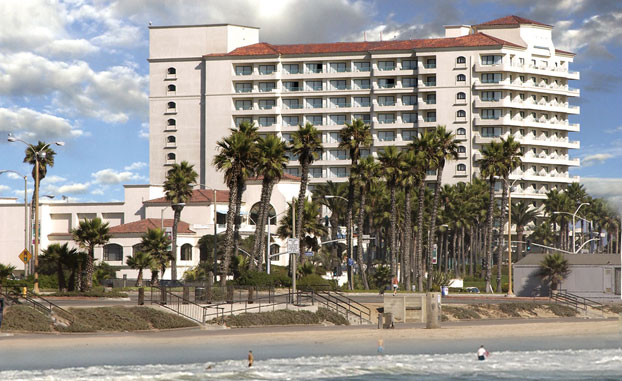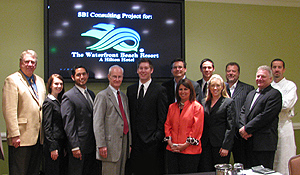 Caption: Business students recently served as consultants, advising the Waterfront Beach Resort on ways the hotel could be more sustainable. Photo courtesy of Waterfront Beach Resort.
Caption: Business students recently served as consultants, advising the Waterfront Beach Resort on ways the hotel could be more sustainable. Photo courtesy of Waterfront Beach Resort.
Green Hospitality
Student Consultants Advise Hotel on Ways to Go Green
When a team of senior business administration majors was charged with the task of studying how an Orange County beach resort could go green, they were taken aback.
But not for long.
Last spring, the four-member team from Cal State Fullerton met with Waterfront Beach Resort’s general manager J.D. Shafer and the executive staff to hear what their needs were. They were expecting something involving the firm’s marketing efforts or finance.
“We put to one side all of our assumptions and other projects and discovered that we were entering one of the most interesting projects that we had ever received,” said Justin Dang, recalling that February meeting.
“We had to transition on the spot and figure out just where we were going to go. Once we did that, we were fine,” said Amanda Unger.
The team did so well, they sold the hotel on the value and bottom line of sustainability.
“The students learned that the Hilton Waterfront Beach Resort had a good grasp on sustainability culture, and through the years had accomplished a tremendous amount of progress that instilled great pride throughout the resort,” noted Shafer. “However, obviously through what has been a difficult and challenging economy, the resort has reshuffled its priorities and unfortunately, sustainability has taken back seat to other projects.
“It was paramount to me that, despite the economy, we continue with our past momentum and partnering with the students at Cal State Fullerton seemed like a perfect next step,” said Shafer. “I was overwhelmingly pleased with the professionalism and due diligence exercised by the students.”
“I told the students early on that proposing items that ‘feel good’ was not good enough,” said Tom Faust of Faust-Rosati Associates, who served as team mentor. “Our goal was to make the Waterfront Hilton a kind of poster child for sustainability for Orange County.”
The first step was to research what the hotel was already doing, then explore changes that could be made that would have demonstrable results. The biggest costs for a hotel, said Daniel Newkirk, are its utilities, electricity, water and gas. “That gave us the focus for the project.”
“We learned so much,” said Dang. “I don’t think any of us knew anything about sustainability other than energy efficient light bulbs. But we did our homework, dug deep for the facts and supporting materials and came up with solid ideas that we could be proud of recommending.”
The team’s report focused on research and recommendations in the areas of:
• Re-initiation of the hotel’s green team with a solid management structure
• Creation of a culture of sustainability
• Institution of utility initiatives that would provide a return on investment equal to or larger than 6.8 percent
• Consideration of changes that would garner certifications, subsidies and rebates
“It was a great experience. Not only in what we learned about sustainability by in how to behave in a professional manner. I had to grow to achieve in this project,” said Newkirk.
“This is something the students can really be proud of,” said Faust, noting that it is one of several campus case studies that will enter competition in the spring for regional and national awards. “They produced an excellent report.”
“Our true success with the team’s recommendations will be a year or two from now, looking back and being proud of our accomplishments – this will be the real payoff for us,” said Shafer, who said the resort plans to share their success and proposals with the Hilton Corporation and industry professionals with desires to tout itself as a leading property on sustainability. “As a destination, eco-tourism is alive and well in Huntington Beach, and it is incumbent upon us as a business to be the epitome of good stewards in our community,” Shafer added.
Sept. 21, 2010

